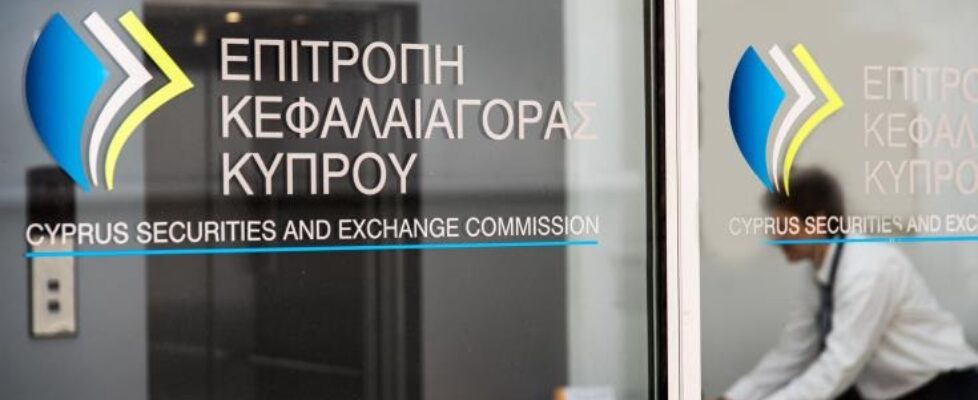CySEC reviews data reported to Trade Repositories
The Cyprus Securities and Exchange Commission (CySEC) today reported the findings of its recently conducted reviews on the quality of data reported to Trade Repositories, under Article 9(1) of EMIR by Regulated Entities.
According to Article 9(1) of EMIR:
“Counterparties and CCPs shall ensure that the details of any derivative contract they have concluded and of any modification or termination of the contract are reported in accordance with paragraphs 1a to 1f of this Article to a trade repository registered in accordance with Article 55 or recognised in accordance with Article 77. The details shall be reported no later than the working day following the conclusion, modification or termination of the contract.”
The purpose of the Reviews was to assess the quality and timeliness of data reported by Regulated Entities to Trade Repositories. The Reviews identified certain areas of concern.
In total, 40 reviews were carried out, during the period 2021 until August 2022, which assessed the reconciliation, completeness, accuracy and timeliness of data reported by Regulated Entities to Trade Repositories. Regulated Entities with the highest number of low quality reports have been reviewed.
Areas of concern/ Observations identified
- Misreporting of details of derivatives contracts
CySEC observed that a number of reports contained contradictory or erroneous details in relation to the derivative contracts that were reported. For example:
i. Option contracts were reported as contracts for difference (‘CFDs’),
ii. CFD contracts were identified with an ISIN and that ISIN corresponded to the CFD’s underlying asset,
iii. Derivatives on e.g. currencies/rates were miss-declared (e.g. a rate derivative was declared as belonging to the equity asset class),
iv. Forward contracts were reported as CFDs and vice versa.
- Incorrect status of derivative contracts
CySEC observed that derivative contracts were not properly terminated with the Trade Repositories by Regulated Entities.
- Collateralisation
Several Regulated Entities reported client (mostly retail client) trades as Partially Collateralised. Partial Collateralisation means that the collateral agreement between the counterparties stipulates that the Reporting Counterparty (i.e. the Regulated Entity) only posts regularly variation margins with respect to the derivative contract, in accordance with Article 3b of Regulation (EU) No 1247/2012 as amended.
- Definition of “working day” for the purpose of determining the deadline for reporting
Several Regulated Entities use reporting intermediaries established outside Cyprus. CySEC observed that the said reporting intermediaries, when e.g. there was a bank/public holiday in their home country while in Cyprus it was a working day, did not submit the appropriate EMIR reports causing late reports.
It is noted that as regards the calendar, Regulated Entities should follow the relevant calendar of the Republic of Cyprus to determine whether a given day is a working day or holiday in accordance with the clarification provided in the ESMA Questions and Answers on Implementation of EMIR.
- Rejections – Delegation of Reporting
A number of Regulated Entities were facing rejection of their reports from the TRs. In several cases, Regulated Entities responded to CySEC that the rejections were caused by an error in the systems of their reporting intermediaries.
It is noted that, as regards delegation of reporting, Regulated Entities should ensure that EMIR provisions are respected at all times (i.e. timely and accurate reporting, etc.) and the Regulated Entities remain liable for any misreporting by third entities they rely upon.
- Reconciliation of reports
CySEC observed that some Regulated Entities were facing pairing and/ or matching issues between their reports and those of their reporting counterparties.
Regulated Entities should have in place procedures for timely agreement/ communication of Unique Trade Identifiers with their reporting counterparties. They should also have in place procedures for agreeing with their reporting counterparties the details reported in common fields of their reports.
- Use of valid legal entity identifiers for counterparties that are legal entities
CySEC observed that some Regulated Entities were using internal client codes and not valid legal entity identifiers to identify counterparties that are legal entities, in accordance with Article 3 of Regulation (EU) No 1247/2012 as amended.
CySEC urges all regulated entities to regularly review the procedures established, implemented and maintained, in relation to EMIR reporting with the aim to ensure that the data reported to Trade Repositories are complete, accurate, consistent, timely and not duplicated.
Regulated Entities not complying with their EMIR reporting obligation will be subject to enforcement action.




